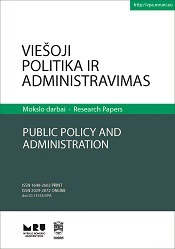Familiarity and Trust: Explaining Trust in Government through Ethno-racial Differences
Familiarity and Trust: Explaining Trust in Government through Ethno-racial Differences
Author(s): Eglė Vaidelytė, Eglė Butkevičienė, Vaidas Morkevičius, Michiel S. De VriesSubject(s): Public Administration, Socio-Economic Research
Published by: Mykolas Romeris University
Keywords: trust in government, ethnic groups; power distance; income inequality; International Social Survey Programme;
Summary/Abstract: The paper investigates whether generalized trust in government varies among ethnic groups in a society. Theories on trust predominantly explain such institutional trust by the capabilities and intentions of the trusted actors, and research into trust is mainly done at the individual level measuring whether individual characteristics of the trustee and trusted one has explanatory power. Meanwhile, this paper analyzes the institutional trust at the macro (country) level. Based on a comparative study among 27 countries, this paper argues that there are significant differences between ethnic groups regarding their trust in the country‘s government and that significant effects are visible with the country‘s income inequality and one of Hofstede‘s dimensions of national culture, namely ‘power distance‘. This is an important finding as it calls for multi-level analyses when explaining institutional trust. Trust is not only dependent on the individual characteristics of the trusted one and the trustee but also on macro-level variables.
Journal: Viešoji politika ir administravimas
- Issue Year: 20/2021
- Issue No: 3
- Page Range: 397-410
- Page Count: 14
- Language: English

